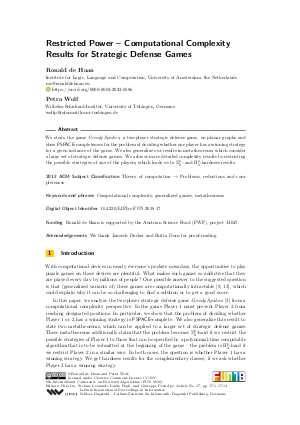Restricted Power - Computational Complexity Results for Strategic Defense Games
Authors
Ronald de Haan  ,
Petra Wolf
,
Petra Wolf
-
Part of:
Volume:
9th International Conference on Fun with Algorithms (FUN 2018)
Part of: Series: Leibniz International Proceedings in Informatics (LIPIcs)
Part of: Conference: International Conference on Fun with Algorithms (FUN) - License:
 Creative Commons Attribution 3.0 Unported license
Creative Commons Attribution 3.0 Unported license
- Publication Date: 2018-06-04
File

PDF
LIPIcs.FUN.2018.17.pdf
- Filesize: 0.48 MB
- 14 pages
Document Identifiers
Subject Classification
ACM Subject Classification
- Theory of computation → Problems, reductions and completeness
Keywords
- Computational complexity
- generalized games
- metatheorems
Metrics
- Access Statistics
-
Total Accesses (updated on a weekly basis)
0Document
0Metadata
Abstract
We study the game Greedy Spiders, a two-player strategic defense game, on planar graphs and show PSPACE-completeness for the problem of deciding whether one player has a winning strategy for a given instance of the game. We also generalize our results in metatheorems, which consider a large set of strategic defense games. We achieve more detailed complexity results by restricting the possible strategies of one of the players, which leads us to Sigma^p_2- and Pi^p_2-hardness results.
Cite As Get BibTex
Ronald de Haan and Petra Wolf. Restricted Power - Computational Complexity Results for Strategic Defense Games. In 9th International Conference on Fun with Algorithms (FUN 2018). Leibniz International Proceedings in Informatics (LIPIcs), Volume 100, pp. 17:1-17:14, Schloss Dagstuhl – Leibniz-Zentrum für Informatik (2018)
https://doi.org/10.4230/LIPIcs.FUN.2018.17
BibTex
@InProceedings{dehaan_et_al:LIPIcs.FUN.2018.17,
author = {de Haan, Ronald and Wolf, Petra},
title = {{Restricted Power - Computational Complexity Results for Strategic Defense Games}},
booktitle = {9th International Conference on Fun with Algorithms (FUN 2018)},
pages = {17:1--17:14},
series = {Leibniz International Proceedings in Informatics (LIPIcs)},
ISBN = {978-3-95977-067-5},
ISSN = {1868-8969},
year = {2018},
volume = {100},
editor = {Ito, Hiro and Leonardi, Stefano and Pagli, Linda and Prencipe, Giuseppe},
publisher = {Schloss Dagstuhl -- Leibniz-Zentrum f{\"u}r Informatik},
address = {Dagstuhl, Germany},
URL = {https://drops.dagstuhl.de/entities/document/10.4230/LIPIcs.FUN.2018.17},
URN = {urn:nbn:de:0030-drops-88082},
doi = {10.4230/LIPIcs.FUN.2018.17},
annote = {Keywords: Computational complexity, generalized games, metatheorems}
}
Author Details
- Institute for Logic, Language and Computation, University of Amsterdam, the Netherlands
Funding
Ronald de Haan is supported by the Austrian Science Fund (FWF), project J4047.
References
- Blizzard Entertainment: Warcraft III. http://eu.blizzard.com/en-gb/games/war3/. Accessed: 2018-02-17.
- Bloons Tower Defense 5. http://bloons.wikia.com/wiki/Bloons_Tower_Defense_5. Accessed: 2018-02-17.
- Greedy Spiders. http://greedyspiders.com/. Accessed: 2018-02-17.
- Nintendo Entertainment System (NES). http://www.pcgames.de/Nintendo-Entertainment-System-NES-Konsolen-255246/. Accessed: 2018-02-01.
- StarCraft: Remastered. https://starcraft.com/en-us/. Accessed: 2018-02-17.
-
Greg Aloupis, Erik D. Demaine, Alan Guo, and Giovanni Viglietta. Classic Nintendo Games are (Computationally) Hard. Theoretical Computer Science, 586:135-160, 2015.

-
Sanjeev Arora and Boaz Barak. Computational Complexity - A Modern Approach. Cambridge University Press, 2009.

-
Ashok K. Chandra, Dexter C. Kozen, and Larry J. Stockmeyer. Alternation. J. of the ACM, 28(1):114-133, 1981.

-
Erik D. Demaine. Playing Games with Algorithms: Algorithmic Combinatorial Game Theory. In Proceedings of the 26th International Symposium on Mathematical Foundations of Computer Science (MFCS), pages 18-33. Springer, 2001.

-
Erik D. Demaine and Robert A. Hearn. Constraint Logic: A Uniform Framework for Modeling Computation as Games. In Proceedings of the 23rd Annual IEEE Conference on Computational Complexity, 2008 (CCC 2008), pages 149-162. IEEE, 2008.

-
Erik D. Demaine, Joshua Lockhart, and Jayson Lynch. The Computational Complexity of Portal and Other 3D Video Games. arXiv preprint 1611.10319, 2016.

-
Michal Forišek. Computational Complexity of Two-Dimensional Platform Games. In Proceedings of the 5th International Conference on Fun with Algorithms (FUN 2010), pages 214-227. Springer, 2010.

-
Graham Kendall, Andrew J. Parkes, and Kristian Spoerer. A Survey of NP-complete Puzzles. ICGA Journal, 31(1):13-34, 2008.

-
David Lichtenstein. Planar Formulae and Their Uses. SIAM J. Comput., 11(2):329-343, 1982.

-
John Michael Robson. The Complexity of Go. In IFIP Congress, pages 413-417, 1983.

-
John Michael Robson. N by N Checkers is Exptime complete. SIAM J. Comput., 13(2):252-267, 1984.

-
Jörg Siekmann and Graham Wrightson, editors. Automation of reasoning. Classical Papers on Computer Science 1967-1970, volume 2. 1983.

-
G. S. Tseitin. Complexity of a Derivation in the Propositional Calculus. Zap. Nauchn. Sem. Leningrad Otd. Mat. Inst. Akad. Nauk SSSR, 8:23-41, 1968. English transl. repr. in [17].

- Giovanni Viglietta. Gaming is a hard job, but someone has to do it! Theory Comput. Syst., 54(4):595-621, 2014. URL: http://dx.doi.org/10.1007/s00224-013-9497-5.
